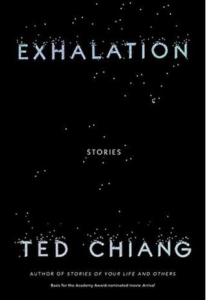Hey, I finally got around to reading the oldest book on my NetGalley list! This is how rich and miserable my reading backlog has been: I verily feel like King Midas on the days I don’t feel like Ado Annie.
 But enough with my random allusions: how is the book, Doreen? (Forgive me, I’m a bit loopy off illness and cold meds.) I actually read it in chunks, covering the relevant stuff for their nominated Hugo year. I enjoyed Anxiety Is The Dizziness Of Freedom well enough, but was definitely not a fan of Omphalos, as my religion is all about both science and metaphor (i.e. none of this young-Earth nonsense. Literalism is death to faith, ime.) Thus the thought exercise presented here was less sympathetic than so much typical “why am I not the center of the universe?” wankery to me.
But enough with my random allusions: how is the book, Doreen? (Forgive me, I’m a bit loopy off illness and cold meds.) I actually read it in chunks, covering the relevant stuff for their nominated Hugo year. I enjoyed Anxiety Is The Dizziness Of Freedom well enough, but was definitely not a fan of Omphalos, as my religion is all about both science and metaphor (i.e. none of this young-Earth nonsense. Literalism is death to faith, ime.) Thus the thought exercise presented here was less sympathetic than so much typical “why am I not the center of the universe?” wankery to me.
I felt similarly with What’s Expected Of Us despite it being less about faith than secular humanism. My religion believes in fate being a map of fixed points, with free will determining how we react to each and how we get from point to point. Muslim lives, unlike the lives of most pre-determinists, aren’t lockstep marches from birth to death. There’s also the important caveat of no one actually knowing what their fate will be, which is why it’s important to live your best life and not judge others’. Ted Chiang actually does an incredible job portraying how Islam deals with future science in the opening story of this collection, The Merchant And The Alchemist’s Gate, which is probably the most colorful — in the sense of evoking visceral setting detail — of the stories included here.
Not that that’s very hard: the stories in Exhalation are rich in intellectual thought and conversation, but emotions tend less towards passion than pathos. And forget about action. Exhalation is mostly thinky speculative pieces that bend towards resignation rather than resolve, with the prime example being the story that gives the collection its name. There’s the occasional touch of sweetness, as in the ending of The Great Silence. The Lifecycle Of Software Objects has a lot of interesting things to say about bonding and affection between humans and AI, with a really thoughtful extrapolation of what AI can be and how humanity’s responsibilities towards them must also evolve. Dacey’s Patent Automatic Nanny was another interesting short riff on parenting, and while The Truth Of Fact, The Truth Of Feeling isn’t technically about parenting, that part of the narrative is what will linger with me longest. I really liked the circular nature of the story within a story, especially with the therapist’s observation that a memory tool will only damage a relationship if the participants use it as a wedge instead of a bridge. Ooh, that’s actually my own turn of phrase and I rather like that, I should keep it.
Anyway, this was a wonderfully cerebral collection of stories that are best suited for when you’re in or pursuing a meditative frame of mind. Mr Chiang is deeply talented at examining the ethics of bleeding edge technology and extrapolating them via science-fiction, portraying (often in best-case scenarios) how they might collide with the real world. The real world, ofc, is far uglier and less dispassionate than he portrays, but his style serves to elegantly and cleanly present the facts as he sees them and his resulting theories. Excellent speculative work, if a bit less hot-blooded than I prefer.
Exhalation by Ted Chiang was first published May 7 2019 by Knopf and is available from all good booksellers, including
